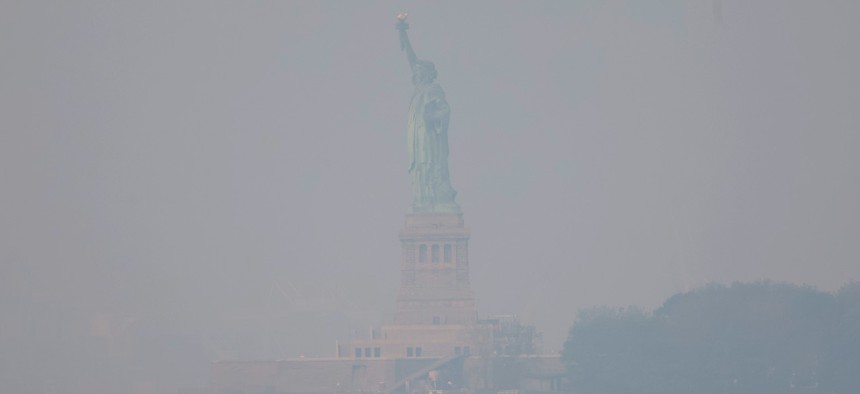
The Statue of Liberty is seen amid hazy conditions due to smoke from the Canadian wildfires on June 08, 2023 in New York City. People in the city and other areas are expected to have another day of bad air Thursday due to smoke from the Canadian wildfires. Michael M. Santiago/Getty Images
Wildfire Smoke Can Harm Human Health, Even When the Fire is Hundreds of Miles Away – a Toxicologist Explains Why
Smoke from more than 100 wildfires burning across Canada has been rolling into North American cities far from the flames.
Smoke from more than 100 wildfires burning across Canada has been rolling into North American cities far from the flames. New York City and Detroit were both listed among the five most polluted cities in the world because of the fires on June 7, 2023. The smoke has triggered air quality alerts in several states in recent weeks.
We asked Chris Migliaccio, a toxicologist at the University of Montana who studies the impact of wildfire smoke on human health, about the health risks people can face when smoke blows in from distant wildfires.
What’s in wildfire smoke that’s a problem?
When we talk about air quality, we often talk about PM2.5. That’s particulate matter 2.5 microns or smaller – small enough that it can travel deep into the lungs.
Exposure to PM2.5 from smoke or other air pollution, such as vehicle emissions, can exacerbate health conditions like asthma and reduce lung function in ways that can worsen existing respiratory problems and even heart disease.
But the term PM2.5 only tells you about size, not composition – what is burning can make a significant difference in the chemistry.
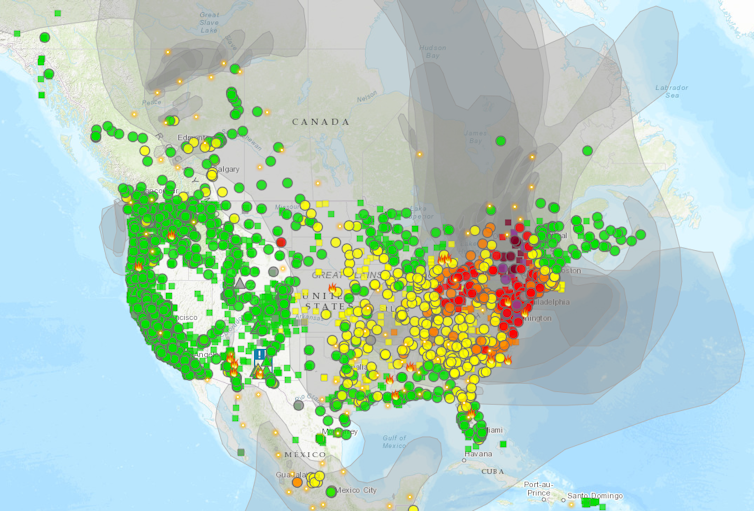
In the northern Rockies, where I live, most fires are fueled by vegetation, but not all vegetation is the same. If the fire is in the wildland urban interface, manufactured fuels from homes and vehicles may also be burning, and that’s going to create its own toxic chemistry, as well. Chemists often talk about volatile organic compounds, (VOCs), carbon monoxide and PAHs, or polycyclic aromatic hydrocarbons produced when biomass and other matter burns having the potential to harm human health.
How does inhaling wildfire smoke harm human health?
If you have ever been around a campfire and got a blast of smoke in your face, you probably had some irritation. With exposure to wildfire smoke, you might get some irritation in the nose and throat and maybe some inflammation. If you’re healthy, your body for the most part will be able to handle it.
As with a lot of things, the dose makes the poison – almost anything can be harmful at a certain dose.
Generally, cells in the lungs called alveolar macrophages will pick up the particulates and clear them out – at reasonable doses. It’s when the system gets overwhelmed that you can have a problem.
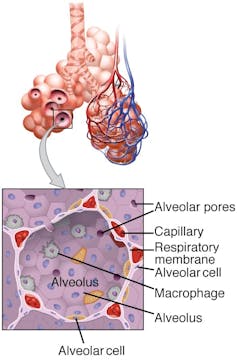
One concern is that smoke can suppress macrophage function, altering it enough that you become more susceptible to respiratory infection. A colleague who looked at lag time in the effect of wildfire smoke exposure found an increase in influenza cases after a bad fire season. Studies in developing countries have also found increases in respiratory infections with people who are cooking on open fires in homes.
The stress of an inflammatory response can also exacerbate existing health problems. Being exposed to wood smoke won’t independently cause someone to have a heart attack, but if they have underlying risk factors, such as significant plaque buildup, the added stress can increase the risk.
Researchers are also studying potential effects on the brain and nervous system from inhaled particulate matter.
When smoke blows over long distances, does its toxicity change?
We know that the chemistry of wildfire smoke changes. The longer it’s in the atmosphere, the more the chemistry will be altered by ultraviolet light, but we still have a lot to learn.
Researchers have found that there seems to be a higher level of oxidation, so oxidants and free radicals are being generated the longer smoke is in the air. The specific health effects aren’t yet clear, but there’s some indication that more exposure leads to greater health effects.
The supposition is that more free radicals are generated the longer smoke is exposed to UV light, so there’s a greater potential for health harm. A lot of that, again, comes down to dose.
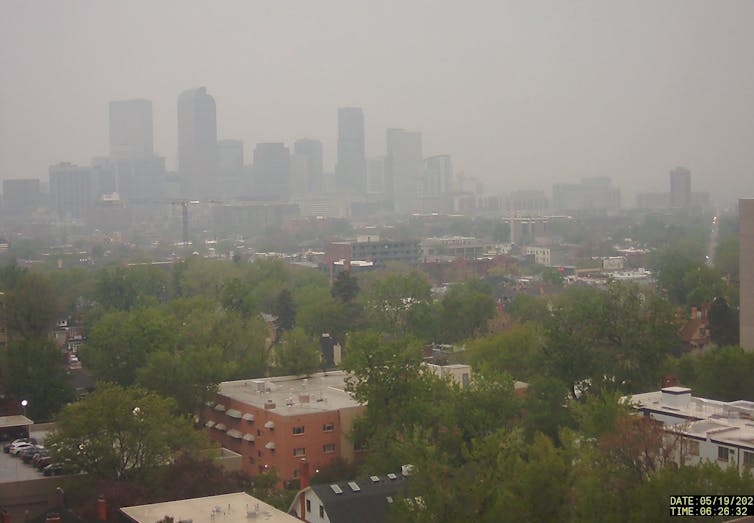
Chances are, if you’re a healthy individual, going for a bike ride or a hike in light haze won’t be a big deal, and your body will be able to recover.
If you’re doing that every day for a month in wildfire smoke, however, that raises more concerns. I’ve worked on studies with residents at Seeley Lake in Montana who were exposed to hazardous levels of PM2.5 from wildfire smoke for 49 days in 2017. We found a decrease in lung function a year later. No one was on oxygen, but there was a significant drop.
This is a relatively new area of research, and there’s still a lot we’re learning, especially with the increase in wildfire activity as the planet warms.
What precautions can people take to reduce their risk from wildfire smoke?
If there is smoke in the air, you want to decrease your exposure.
Can you completely avoid the smoke? Not unless you’re in a hermetically sealed home. The PM levels aren’t much different indoors and out unless you have a really good HVAC system, such as those with MERV 15 or better filters. But going inside decreases your activity, so your breathing rate is slower and the amount of smoke you’re inhaling is likely lower.
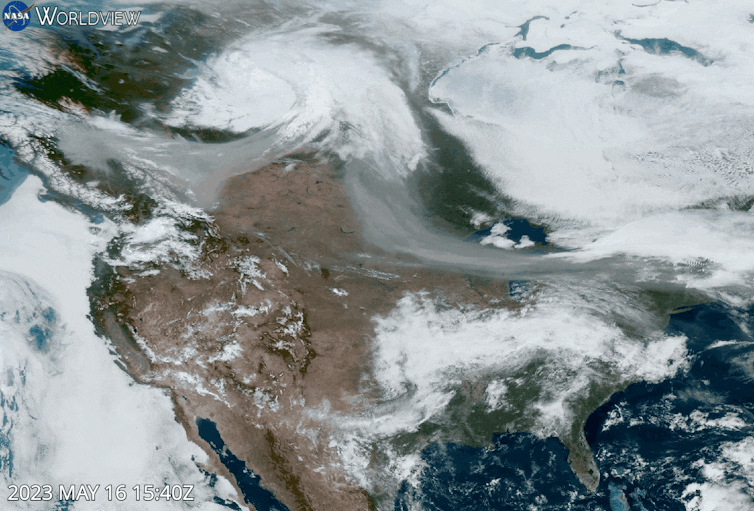
We also tend to advise people that if you’re in a susceptible group, such as those with asthma, create a safe space at home and in the office with a high-level stand-alone air filtration system to create a space with cleaner air.
Some masks can help. It doesn’t hurt to have a high-quality N95 mask. Just wearing a cloth mask won’t do much, though.
Most states have air quality monitors that can give you a sense of how bad the air quality is, so check those sites and act accordingly.
This article was updated June 7, 2023, with thick wildfire smoke over the U.S. Northeast and the latest map of smoke conditions.
Christopher T. Migliaccio, Research Associate Professor in Toxicology, University of Montana
This article is republished from The Conversation under a Creative Commons license. Read the original article.
NEXT STORY: GovExec Daily Comes To An End




